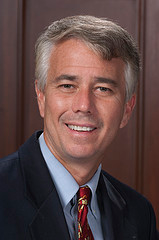The dog that did not bark in the 2016 election was the long-delayed nomination of Merrick Garland to fill the vacant Supreme Court seat. In an unprecedented move, the Republican-controlled Senate vowed not to consider Garland, but instead to wait for the next president to select the next court justice. Just recently, Senator John McCain suggested that a GOP-controlled Senate might not even consider a nominee from the next president, if that president is
 Steven J. Mulroy
Steven J. Mulroy
Hillary Clinton. (He has since walked back this comment, but the overall impression is troubling.)
This issue deserves more attention than it has received. Several important cases this term were tied 4-4, and the Supreme Court has accepted fewer cases of import for this term because of the risk of deadlock. When the court doesn’t decide important cases, uncertainty rules, and important rights go unvindicated.
But the problem is worse than you might think, because of a related, unsexy but crucial issue of judicial gridlock: confirmation of trial court judges.
The Supreme Court nominations, of course, get the most attention, and for good reason: They’re the final word, especially on constitutional questions. Next in line for attention are the intermediate appellate-level judgeships one level below the Supreme Court, the Circuit Courts of Appeals. In these two categories, confirmation obstruction and high vacancy rates have not been a crisis in recent years — with the (huge) exception of Garland.
But a different pattern emerges at the lowest level, the trial courts known as federal district courts. This is where the rubber meets the road in the federal judicial system, the workhorses over the showhorses. This is where federal criminal trials occur, where consumer, civil rights, and environmental cases get their hearing. The vast majority of cases get a final resolution at this level and are not appealed.
It’s here where the confirmation rate has slowed dramatically in the last two years.
As a result, district court vacancies have more than doubled since last year, to 77. More than half of those have been vacant for more than a year, and a quarter for more than two years. That’s over one out of every 10 trial-level judgeships vacant, and the trend line is disturbing.
This sluggish replacement rate has real-world effects. Criminal cases take longer to get to trial, and defendants, including innocent defendants, stay in jail longer awaiting trial. Civil cases get pushed to the back of the line, with the delays there even longer.
The U.S. Administrative Office of the Courts has a special category of “judicial emergencies” based on case filings per judgeship, length of the judicial vacancy, and other factors. By this official measure, over a third of the 75 current vacancies are considered “emergencies.”
This gridlock hits home here in Memphis. We currently have one full-time district court vacancy out of 77 vacant. Last year, based on the recommendation of Representative Steve Cohen, President Obama nominated Ed Stanton III, the eminently qualified U.S. Attorney.
Stanton’s nomination has been pending on the Senate floor since it was reported out of committee last October. Just recently, U.S. Senator Cory Booker protested on the Senate floor the attempt by Senate Majority Leader Mitch McConnell to put through what he called a “bipartisan package” of proposed judicial confirmations, a package which skipped over a New Jersey district court nominee and Memphis’ Stanton. Senator Booker complained that the only two African-American candidates on the list were skipped, despite the fact that they are among the longest-waiting nominees.
The irony is that these trial-level judges are the least political of all. Supreme Court judges, and to a lesser extent appellate judges, can use their policy preferences to inform their legal decisions. But trial judges are much less free to do this, because so much of their freedom of action is restricted by binding appellate precedent. If they don’t follow this precedent, they can get reversed.
A number of solutions exists to this problem. Currently, senators are allowed to place anonymous “holds” on pending nominees, indefinitely delaying consideration. No one senator should have this power, and any senator wanting to delay a nominee should publicly own up to it and give a good explanation.
But more important, we should acknowledge that at the trial level, it’s not about politics, it’s about garden variety justice. It is not less true for being a cliché: Justice delayed is justice denied.
Steve Mulroy served two terms on the Shelby County Commission, and is assistant dean at the University of Memphis Law School.